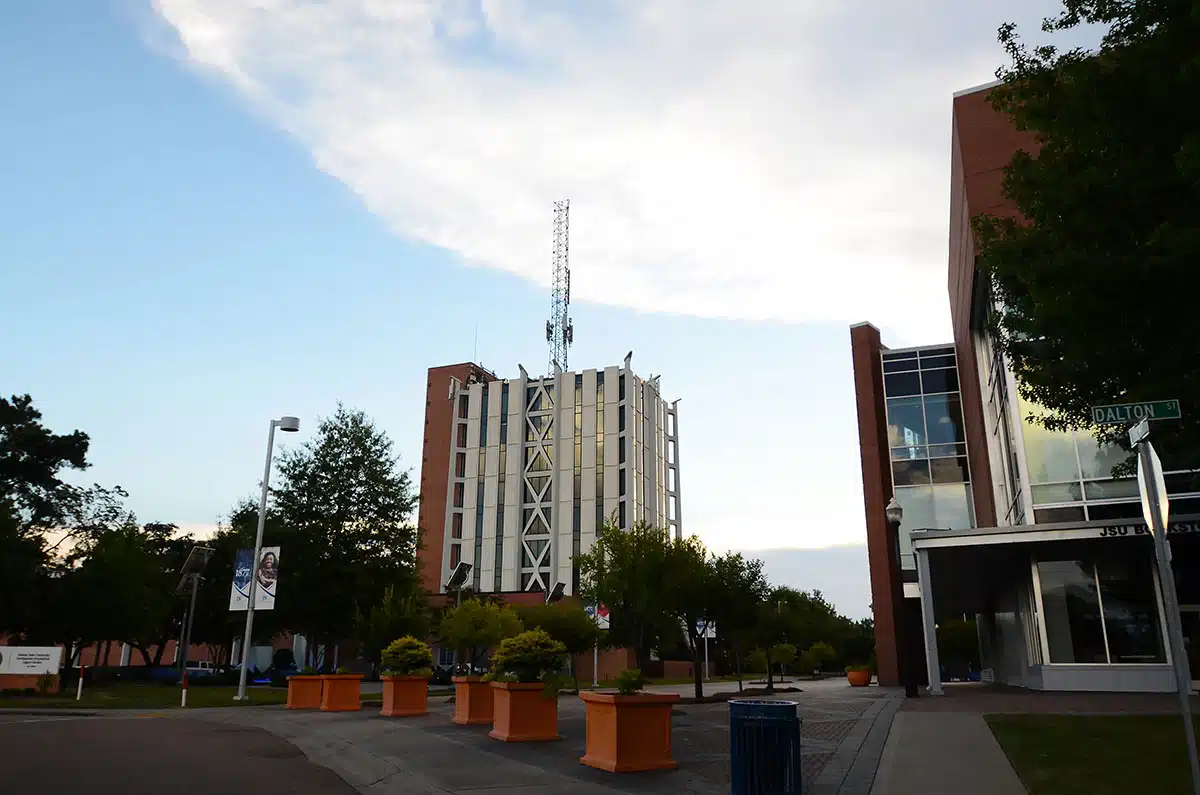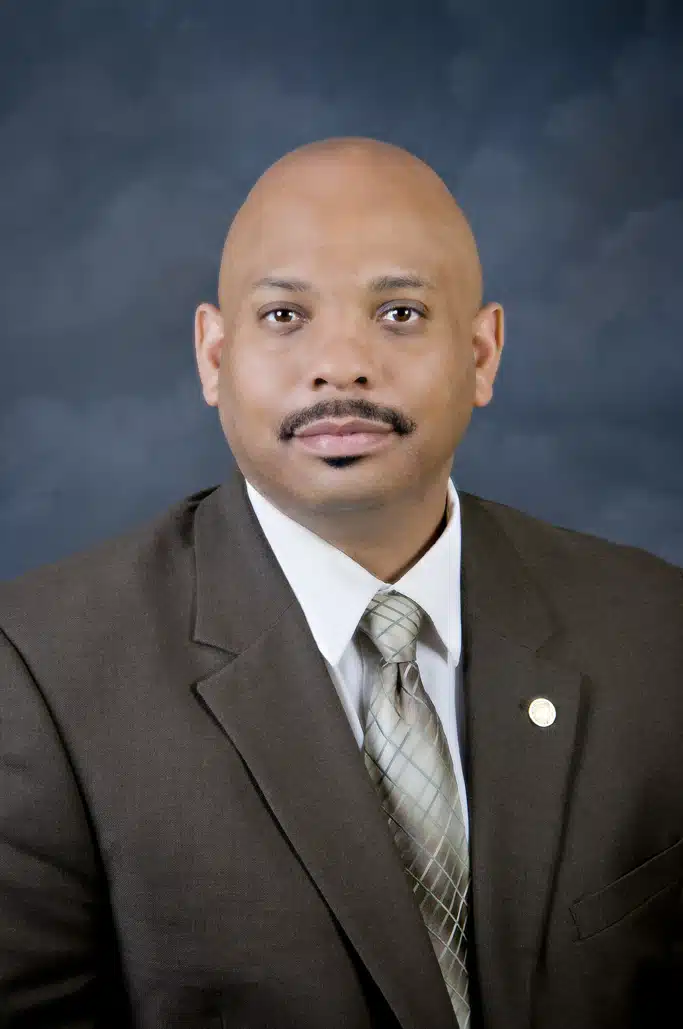Mississippi Today
JSU Development Foundation under scrutiny for alleged ‘unintended’ use of restricted dollars as presidential selection looms

Concerns about poor recordkeeping, inadequate accountability and the possible “unintended” use of restricted dollars led a member of the Jackson State University Development Foundation board to quietly resign earlier this year.
In his June 23 resignation letter, Brian Johnson, a 2009 Jackson State graduate who had served on the board for six years, wrote that he was stepping down after the board failed to pass his motion for a forensic audit.
Johnson was alarmed by internal presentations that he wrote showed the cash-strapped foundation using donor-restricted dollars to pay for its general obligations. But the foundation’s recent annual audits, Johnson wrote, had no discussion of the potentially improper spending.
“As a business professional in the financial services industry, I can’t seem to comprehend how the JSUDF Board of Directors received two financial reports over the last two years from two different JSU Division of Institutional Advancement comptrollers indicating the unintended use of restricted/designated funds, but the Foundation’s CPA audited financial statements have no note or mention of this information,” he wrote.
When contacted by Mississippi Today, Johnson would not comment for this story.
Johnson’s resignation letter is part of a cache of internal foundation documents that was obtained by Mississippi Today as Jackson State is poised to receive a new president. Last week, the Institutions of Higher Learning governing board for Mississippi’s public universities held a special-called meeting to discuss the imminent hire for just 16 minutes.
Taken together, the documents raise questions at the core of the foundation’s fiscal health. One document showed the foundation lacking about $7.6 million in “cash on hand to cover fund balances” and its operating budget, on average, bleeding at least $100,000 every year since 2012. Another, an internal audit that Jackson State completed in late September, determined the foundation was commingling in one account its operating and donor-restricted dollars for alumni, athletics and annual scholarships.
Brian Mittendorf, an Ohio State University accounting professor who reviewed the documents for Mississippi Today, said it wasn’t clear how the foundation has enough liquidity, or cash-on-hand, to meet its obligations, including scholarships and financial support for university athletics.
“There’s this consistent nagging issue which is that a substantial amount of their assets are restricted, though the exact amount is somewhat unclear,” he said.
But Mittendorf said he was only able to reach that conclusion — one of the concerns that led Johnson to resign — after reading “between the lines” of the foundation’s audit. He didn’t understand why the foundation’s audits are not drawing attention to the existential financial situation it appears to be facing.
“Somewhat surprisingly, they aren’t shouting about that from the rooftops in the financial statement,” Mittendorf said.
In an email, an IHL spokesperson wrote that “IHL does not govern the JSU Development Foundation, so questions about the foundation’s assets should be addressed to the foundation.” But IHL’s bylaws do permit the board to exercise a certain amount of oversight over the university-affiliated foundations, such as giving prior approval if a president wishes to sever ties with the foundation.
The foundation chair, Guyna “Gee” Johnson, a managing director of global fund ratings at S&P who has led the foundation since 2021, asked Mississippi Today to email her questions for this article but did not respond to repeated requests for comment by press time.
In a sit-down interview with JSUTV earlier this year, Gee said that “one of the things the board would like to do is to bring more attention to what we’re doing so people feel safe and they trust that we are being good stewards over their money so that they can continue to help our students grow.”
$7 million cash on-hand deficit?
The development foundation was founded in the 1960s to financially support Jackson State. It has been in hot water in recent years after an independent audit that IHL called for found tens of thousands of dollars in questionable credit card spending in 2014, leading the foundation to cancel its credit cards.
Johnson got on the board in 2017, a year after that independent audit was made public by the Clarion Ledger. But internally, the foundation was facing even more challenges than Johnson knew, he wrote in his resignation letter.
“It was then I learned the Foundation was behind on 990’s, facing legal issues due to past Foundation ventures/contracts and not having completed audited financial statements for the two prior years,” he wrote.
The board proceeded to work together to resolve the issues, Johnson wrote. In 2019, a resolution was introduced to acknowledge that the board had borrowed funds from temporarily restricted accounts, as well as its permanently restricted endowment, due to “having insufficient unrestricted operating dollars.”
The foundation, according to the resolution, intended to repay the “interfund debt,” which at the time totaled about $1.8 million. It’s unclear from the document Mississippi Today received if the foundation adopted the resolution.
And last year, the foundation finally executed the sale of One University Place, a mixed-use apartment complex across the street from Jackson State’s campus that was draining the foundation’s bank accounts, to the university for $6.9 million.
But it appears the sale wasn’t enough to get the foundation in the clear, according to the foundation’s 2021 audit and two internal PowerPoints presented earlier this year by Keilani Vanish and Sophia Williams, comptrollers for the foundation.
As of May 18, the date of the most recent presentation, the foundation’s restricted fund balances, which cover its designated accounts, totaled $11.6 million. But the foundation had just under $4 million in its operating accounts, leaving a roughly $7 million deficit in “cash on hand to cover fund balances.” A presentation in February showed a similar situation.
That’s when Johnson, who served on the finance committee, began to wonder why that information wasn’t included in the foundation’s audited financial statements, according to his letter.
The foundation should be communicating the difference between those documents to board members, Mittendorf said.
“The concerning part is if someone on a board is unaware of why those things deviate,” he said.
Mittendorf reviewed the internal presentations and the foundation’s 2021 audit, the most recent publicly available. Both documents, he said, were confusing for him to follow.
David Ewing, the accountant who oversaw the audit, said he couldn’t answer any questions about the foundation, because the university is “pretty strict” about the information it gives out and he didn’t want to lose a client.
Though Mittendorf didn’t go so far as to question whether the 2021 audit was accurate, he noted that it appeared to contradict itself. On page 3, the audit shows the foundation has about $33 million net assets “with donor restrictions, but on page 22, in a section titled “liquidity and availability,” the audit claims that the foundation has “no donor restricted net assets.”
That same section, Mittendorf pointed out, claims the foundation has access to about $35 million in “financial assets available to meet cash needs for general expenditures within one year.” But that doesn’t add up, he said, considering the audit also states the foundation has just under $42 million in total financial assets at year-end, with over $37 million of that in the restricted endowment.
Meanwhile, the foundation is holding a substantial amount of debt. In 2021, the foundation extended its credit line with Merrill Lynch from $2 million to $6.9 million, “secured with certain investments accounts held by Merrill Lynch in the name of the Foundation.” The balance was $5.9 million, according to the May comptroller presentation.
At BankPlus, the foundation has a $3 million credit line but the most recent balance is unclear.
A one-page internal audit
Johnson wasn’t the only one with questions. On June 1, an ex-officio board member emailed Gee and the board because there were rumors in the community about the presentation that allegedly showed the foundation spending restricted dollars.
When Gee replied-all on June 9, she wrote that if the community had access to that presentation, which was prepared for “various internal management or other analytical purposes” and was not an official financial position, then an “extremely serious breach of confidentiality” had occurred.
“The matters you mention in your email have been things that JSUDF boards, University Presidents and University CFOs have been aware of for at least 15+ years, and we have been addressing directly through corrective measures,” Gee wrote. “As we have University turnover, the board chair’s transition policy is to immediately request a meeting to properly provide an official financial update, provide and (sic) overview of the Foundation and align our goals with the new administration’s strategic plan.”
A week later, a similar concern about the “potential misuse of donated funds” led Jackson State to start conducting an internal audit of the foundation that was finalized in September, according to a copy.
It was only one page.

Though the university’s internal auditor, Christopher Thomas, wrote in an email that IHL Commissioner Alfred Rankins requested the internal audit, an IHL spokesperson wrote in an email that Elayne Hayes-Anthony called for it.
Hayes-Anthony has been the university’s temporary acting president since Thomas Hudson resigned earlier this year for reasons that remain unclear. She holds one of seven ex-officio spots on the board, the one reserved for the university president.
“Commissioner Rankins did not call for an internal audit of the foundation,” Kim Gallaspy, IHL’s interim communications director, wrote in an email to Mississippi Today. “Dr. Elayne Hayes-Anthony initiated the process by expressing concerns to the Board of Trustees about the use of JSU Development Foundation funds. Dr. Anthony was advised to exercise her authority to have her concerns investigated by utilizing the university’s internal audit staff to review any Foundation books, records or accounts needed to monitor and verify proper use of donated funds.”
Thomas wrote that he did not find any “current evidence” of misused donor funds, but that the foundation’s bank accounts only had $4.4 million as of Aug. 31 while the “designated accounts” totaled $11.8 million, a finding that correlates with the internal presentations.
“While the Development Foundation liquid funds are not adequate to cover the Designed Accounts, this does not represent the financial position of the Development Foundation,” he wrote. “The Foundation holds a multitude of assets that can be utilized to meet its financial obligation to the University.”
Though Thomas did not specify what those assets are, he did identify six areas where the foundation could improve its internal controls. Specifically, he recommended the foundation should monitor its budgets “based on actual revenue throughout the fiscal year to reduce overspending.”
He also recommended the foundation establish “separate bank accounts” for the operating budget — called “the Excellence Fund” — and the donor gifts, which were commingled.
Mittendorf said foundations should keep records in a way that prevents concerns about funds getting mixed up.
“When you have donor designed and donor restricted gifts, you want impeccable record keeping that segregates the funds,” he said.
It’s unclear if the foundation has done that.
This article first appeared on Mississippi Today and is republished here under a Creative Commons license.
Mississippi Today
Ex-MPB leader says ‘Sesame Street’ enriched his young life, but he worries for future of public broadcasting
Editor’s note: This essay is part of Mississippi Today Ideas, a platform for thoughtful Mississippians to share fact-based ideas about our state’s past, present and future. You can read more about the section here.
I was 7 years old when those funny-looking characters appeared on our black-and-white TV set. We lived in what the Tupelo city folk considered the country. If there was such a thing as cable, we surely didn’t know anything about it. The only static-free channel on our dial was the NBC affiliate, and that’s because the station on Beech Springs Road was barely a mile from our house. Suddenly, there was this new station – PBS.
Those funny-looking characters were from this new show called “Sesame Street,” and they had me hooked from the first day. Of course, I was happy to have another TV choice. But this one was different. Skillfully included in the humorous scenes with Ernie and Bert, Oscar the Grouch, Cookie Monster and Big Bird were educational messages that proved educationally life-changing for my family and me.
PBS aired “Sesame Street” – the same PBS that helped teach scores of children in our nation, including me, to read. And it’s the same PBS and member stations that just had their two-year forward-funding appropriation yanked by a $9 billion GOP-led rescission bill that finally succeeded in doing what “Sesame Street” teaches against – bullying.
After a long media career, including more than a decade as editor of The Clarion-Ledger, I spent another decade as executive director of Mississippi Public Broadcasting. It was one of my proudest moments for a kid from Saltillo, a child who came from a family of sharecroppers, to occupy the top seat in public broadcasting in my home state and to ultimately get elected to PBS’s national board of directors.
A kid who admired public media became an executive who ran a statewide operation and helped shape policy nationally. It felt like a dream.
For those who care as much as I do about public media, it is unfathomable, inconceivable and plain dumb – choose your adjective – that both PBS and NPR stations are being picked on, possibly dismantled. And for what? Their financial impact on the multi-trillion-dollar federal budget is minuscule. The inexplicable action carried out by the GOP majority has hurt me deeply. While Republican members run home on recess to avoid further questions about Jeffrey Epstein, my mind can’t get away from the inevitable obliteration of content from local stations that looms.
PBS and NPR are certainly weakened by the passage of the recission, but it will be the rural stations in rural towns without wealthy donors that will feel the most pain. It is a foregone conclusion that some stations already barely getting by will close.
One industry executive described the cuts as “catastrophic, devastating, unnecessary and mean-spirited.” Several stations have already had layoffs and there will be more.
The Corporation for Public Broadcasting, which announced Aug. 1 that it will begin shutting down in September, has been the congressional arm doling out funds to stations since 1967. For years, despite the shortsightedness of some members of Congress, CPB, with the assistance of affinity groups, fought off funding threats and delivered to the 1,500 stations federal dollars that were their lifeline.
Not this time.
The recent action to claw back the $1.1 billion public broadcasting receives over two years is a blow that most likely will place the industry as we know it in an unrecoverable position.
The public media system and local stations have led the way in delivering some of the country’s best programming. PBS, for example, was among the first to bring to viewers travel shows, DIY content, cooking shows featuring cultural icons like the great Julia Child. There’s also Bob Ross, with his soothing voice, who made us all believe that we, too, could paint beautiful landscapes.
The children’s programming, which my grandchildren faithfully watch, cannot be matched by those with commercial interests. It provides a safe place for children, which is not always the case with the others.
NPR frequently sets the agenda for the news of the day – often scooping better-financed media companies – with hosts and producers who have a knack for securing interviews with top newsmakers. Their aggressive reporting has always struck a nerve with thin-skinned politicians. As executive director of MPB, it was NPR that kept my phone ringing with lawmakers threatening to pull funding.
Public broadcasting will survive in some form. It has been wounded, but it has not been silenced. I would not be truthful, however, if I didn’t believe that its strong voice has been reduced to a whisper.
The American people have supported public broadcasting with their viewership and donations, the perfect public-private partnership. But I don’t believe small-town America can keep up. Some larger stations will struggle, as well.
So many people in my circle of friends have given their entire careers to public media. They won’t give up that easily. But they’ve been dealt a bad hand, a setback that has every station accountant working overtime to save as many people as they can.
What do I predict?
Expect to see mostly national programming and fewer local productions. Expect to see talented radio and TV professionals in the job market. But don’t expect to see public media and the ingenuity of its people give up. They will never quit.
Ronnie Agnew was named general manager of New Jersey Advance Media in 2022. He is a Mississippi native who has been in the media industry for more than 40 years. Agnew is a former executive editor of The Clarion-Ledger and former executive director of Mississippi Public Broadcasting. While editor of The Clarion-Ledger, Agnew received four President’s Rings, honoring editors in the Gannett Co. for exemplary performance. He also was honored with the Silver Em from the University of Mississippi. He is also a member of the University of Southern Mississippi Journalism Hall of Fame.
This article first appeared on Mississippi Today and is republished here under a Creative Commons Attribution-NoDerivatives 4.0 International License.
The post Ex-MPB leader says ‘Sesame Street’ enriched his young life, but he worries for future of public broadcasting appeared first on mississippitoday.org
Note: The following A.I. based commentary is not part of the original article, reproduced above, but is offered in the hopes that it will promote greater media literacy and critical thinking, by making any potential bias more visible to the reader –Staff Editor.
Political Bias Rating: Center-Left
The content expresses strong support for public broadcasting and criticizes recent funding cuts led by a GOP majority, framing these actions as harmful and shortsighted. It emphasizes the value of PBS and NPR in education and journalism, which aligns with a center-left perspective that typically favors public media funding and government support for educational and cultural institutions. The critique of Republican lawmakers and concern for rural communities further situates the piece within a center-left viewpoint without veering into extreme partisanship.
Mississippi Today
Brain drain: Mother understands her daughters’ decisions to leave Mississippi
Editor’s note: This Mississippi Today Ideas essay is published as part of our Brain Drain project, which seeks answers to Mississippi’s brain drain problem. To read more about the project, click here.
Back when I was a kid in 1988, my mama and I had an argument about what I wanted to major in at college.
I had dreamed of being a journalist since the age of 8. To me, that meant that I was going to Ole Miss, which had the journalism department.
My mama said I could only go away from home to Ole Miss if I was going to major in law.
So I settled on going to Mississippi State University just down the road and majoring in communication. She told me I should major in engineering since that’s what State was known for.
I said, “That’s even dumber than me going to law school. I hate math.”
“Well, you could at least try,” she said.
I said no. Then she told me I was wasting my education and turned her back on me.
I get it. She knew and I knew that I couldn’t stay in Choctaw County where I was raised and earn a living with that degree. I would have to go somewhere else — probably to the Jackson metro area and work for Gannett or the Associated Press. Or to Memphis. Or Biloxi. Or even New Orleans. She never really forgave me for moving to the Jackson metro, working in my field and raising her grandchildren so far from her.
After a while, I got used to the pace of life around here. I knew I probably wouldn’t ever move anywhere else because I noticed that people who left Mississippi often came back, whether due to family obligations or a realization that “somewhere else” wasn’t quite all it was cracked up to be.
I also noticed that a lot of people played up how they were from Mississippi while making a very good living being someplace else. I decided I wanted to prove you could be from Mississippi, live in Mississippi, work in Mississippi and make something of yourself without leaving Mississippi.
But I noticed something else over the years, too. Most of the kids in Brandon dreamed of going off from home to cities like Atlanta, Nashville, Dallas, DC, New York or Orlando. They didn’t seem to have reasons — just a desire to get away from the state as fast as they could.
Then my three daughters and I started having conversations about what they wanted to major in when they went to college. My oldest wanted to be a chef. My middle one was undecided between chemical engineering and landscape architecture. And my youngest was fascinated with roads and bridges.
I was all too aware of what had happened in the job markets in Mississippi since I had come up. Companies closed operations in a globalized economy and fled to cheaper labor markets. The advent of the internet meant employers could hire from all over the world. Longtime business leaders retired and sold out to big corporations that reduced investments in local communities that had supported those businesses for decades and then complained that those towns didn’t offer enough amenities for their employees to want to relocate there.
But the reality really set in when my chef daughter chose her first internship — in historic Williamsburg, Virginia.
I would never have dreamed of driving that far from home to try out a place to work when I was her age. Then after her senior year, she interned at Walt Disney World and got hired full-time before the internship was over. She was off to live in Orlando where now with her husband and young son she’s creating community and loves going to work every day with a pretty enviable benefits package, too, a thing unheard of in the culinary world in Mississippi.
My middle one finally settled on chemical engineering and was picked for a co-op job in her first semester at age 18 at a company in Georgia. When she graduated four years later, we packed her off to Indiana for a research and development job, and she now lives in New Hampshire with her husband, making six figures a year at 26 years old and looking forward to partaking in the cultural offerings in New York City when she can.
The youngest is currently in college for civil engineering, and I’m bracing myself for the inevitable. She doesn’t want to work for state government, so she’s likely going out of state as well. Her comment about coming back to Jackson metro was the most damning of all. “There’s nothing to do here,” she says.
A lot of people ask me questions: How often do you see your daughters? How can you stand being so far from your grandson? Don’t they at least come home for Christmas?
The answer to all of those questions is that we do the best we can. We text, we message on Facebook, we talk on the phone at least once a week, every Sunday. We arrange visits; sometimes it’s us driving to them while other times they drive to us.
I can’t imagine making my children as miserable as my mom made me over my life choices. We are flexible, understanding, and very, very proud of our daughters, who are grappling with enough in their lives without us loading them down with guilt over when they are coming home.
The calculus may change in the future. We may have declines in health and need to move closer to one of our children if we need assistance. Or we may need to be in assisted living care here in Mississippi where such care may be marginally cheaper than wherever our girls land.
But I don’t wish our girls had settled for life in Mississippi.
What I wish is that Mississippi could find a way to live up to its potential — to be a place more worthy of my daughters’ loyalty, affections and investment in themselves.
Maybe it will be someday. I hope so, for all of our sakes.
Julie Liddell Whitehead lives and writes from Mississippi. An award-winning freelance writer, Julie covered disasters from 9/11 to Hurricane Katrina throughout her career. Her first book is “Hurricane Baby: Stories,” published by Madville Publishing. She writes on mental health, mental health education and mental health advocacy. She has a bachelor’s degree in communication, with a journalism emphasis, and a master’s degree in English, both from Mississippi State University. In 2021, she completed her MFA from Mississippi University for Women.
This article first appeared on Mississippi Today and is republished here under a Creative Commons Attribution-NoDerivatives 4.0 International License.
The post Brain drain: Mother understands her daughters' decisions to leave Mississippi appeared first on mississippitoday.org
Note: The following A.I. based commentary is not part of the original article, reproduced above, but is offered in the hopes that it will promote greater media literacy and critical thinking, by making any potential bias more visible to the reader –Staff Editor.
Political Bias Rating: Center-Left
This essay reflects a Center-Left perspective by focusing on social and economic challenges faced by Mississippi, such as brain drain, job market changes, and community decline. The tone is empathetic and advocates for investment in local opportunities and amenities to retain talent, aligning with progressive concerns about economic inequality and regional development. However, it remains largely personal and reflective rather than explicitly ideological or partisan. The article critiques systemic economic shifts without advancing a polarized political agenda, emphasizing hope for future improvement and a more supportive environment for young professionals.
Mississippi Today
After 30 years in prison, Mississippi woman dies from cancer she says was preventable
Behind Bars, Beyond Care:
A Mississippi Today investigation into suffering, secrecy and the business of prison health care
Susie Balfour, diagnosed with terminal breast cancer two weeks before her release from prison, has died from the disease she alleged past and present prison health care providers failed to catch until it was too late.
The 64-year-old left the Central Mississippi Correctional Facility in December 2021 after more than 30 years of incarceration. She died on Friday, a representative for her family confirmed.
Balfour is survived by family members and friends. News of her passing has led to an outpouring of condolences of support shared online from community members, including some she met in prison.
Instead of getting the chance to rebuild her life, Balfour was released with a death sentence, said Pauline Rogers, executive director of the RECH Foundation.
“Susie didn’t just survive prison, she came out fighting,” Rogers said in a statement. “She spent her final years demanding justice, not just for herself, but for the women still inside. She knew her time was limited, but her courage was limitless.”
Last year, Balfour filed a federal lawsuit against three private medical contractors for the prison system, alleging medical neglect. The lawsuit highlighted how she and other incarcerated women came into contact with raw industrial chemicals during cleaning duty. Some of the chemicals have been linked to an increased risk of cancer in some studies.
The companies contracted to provide health care to prisoners at the facility over the course of Balfour’s sentence — Wexford Health Sources, Centurion Health and VitalCore, the current medical provider — delayed or failed to schedule follow-up cancer screenings for Balfour even though they had been recommended by prison physicians, the lawsuit says.
“I just want everybody to be held accountable,” Balfour said of her lawsuit. “ … and I just want justice for myself and other ladies and men in there who are dealing with the same situation I am dealing with.”
Rep. Becky Currie, who chairs the House Corrections Committee, spoke to Balfour last week, just days before her death. Until the very end, Balfour was focused on ensuring her story would outlive her, that it would drive reforms protecting others from suffering the same fate, Currie said.
“She wanted to talk to me on her deathbed. She could hardly speak, but she wanted to make sure nobody goes through what she went through,” Currie said. “I told her she would be in a better place soon, and I told her I would do my best to make sure nobody else goes through this.”
During Mississippi’s 2025 legislative session, Balfour’s story inspired Rep. Justis Gibbs, a Democrat from Jackson, to introduce legislation requiring state prisons to provide inmates on work assignments with protective gear.
Gibbs said over 10 other Mississippi inmates have come down with cancer or become seriously ill after they were exposed to chemicals while on work assignments. In a statement on Monday, Gibbs said the bill was a critical step toward showing that Mississippi does not tolerate human rights abuses.
“It is sad to hear of multiple incarcerated individuals passing away this summer due to continued exposure of harsh chemicals,” Gibbs said. “We worked very hard last session to get this bill past the finish line. I am appreciative of Speaker Jason White and the House Corrections Committee for understanding how vital this bill is and passing it out of committee. Every one of my house colleagues voted yes. We cannot allow politics between chambers on unrelated matters to stop the passage of good common-sense legislation.”
The bill passed the House in a bipartisan vote before dying in the Senate. Currie told Mississippi Today on Monday that she plans on marshalling the bill through the House again next session.
Currie, a Republican from Brookhaven, said Balfour’s case shows that prison medical contractors don’t have strong enough incentives to offer preventive care or treat illnesses like cancer.
In response to an ongoing Mississippi Today investigation into prison health care and in comments on the House floor, Currie has said prisoners are sometimes denied life saving treatments. A high-ranking former corrections official also came forward and told the news outlet that Mississippi’s prison system is rife with medical neglect and mismanagement.
Mississippi Today also obtained text messages between current and former corrections department officials showing that the same year the state agreed to pay VitalCore $100 million in taxpayer funds to provide healthcare to people incarcerated in Mississippi prisons, a top official at the Department remarked that the company “sucks.”
Balfour was first convicted of murdering a police officer during a robbery in north Mississippi, and she was sentenced to death. The Mississippi Supreme Court reversed the conviction in 1992, finding that her constitutional rights were violated in trial. She reached a plea agreement for a lesser charge, her attorney said.
As of Monday, the lawsuit remains active, according to court records. Late last year Balfour’s attorneys asked for her to be able to give a deposition with the intent of preserving her testimony. She was scheduled to give one in Southaven in March.
Rogers said Balfour’s death is a tragic reminder of systemic failures in the prison system where routine medical care is denied, their labor is exploited and too many who are released die from conditions that went untreated while they were in state custody.
Her legacy is one RECH Foundation will honor by continuing to fight for justice, dignity and systemic reform, said Rogers, who was formerly incarcerated herself.
This article first appeared on Mississippi Today and is republished here under a Creative Commons Attribution-NoDerivatives 4.0 International License.
The post After 30 years in prison, Mississippi woman dies from cancer she says was preventable appeared first on mississippitoday.org
Note: The following A.I. based commentary is not part of the original article, reproduced above, but is offered in the hopes that it will promote greater media literacy and critical thinking, by making any potential bias more visible to the reader –Staff Editor.
Political Bias Rating: Center-Left
This article presents a critical view of the Mississippi prison health care system, highlighting systemic failures and medical neglect that led to the death of a formerly incarcerated woman. The tone and framing focus on social justice issues, prisoner rights, and the need for government accountability and reform, which align with Center-Left values emphasizing government responsibility for vulnerable populations. While the article is largely investigative and fact-based, its emphasis on advocacy for reform, criticism of privatized prison health contractors, and highlighting bipartisan legislative efforts suggest a Center-Left leaning perspective rather than neutral reporting.
-
News from the South - Oklahoma News Feed3 days ago
Former payroll director ordered to prison, must repay district nearly $500,000
-
News from the South - North Carolina News Feed6 days ago
Two people unaccounted for in Spring Lake after flash flooding
-
News from the South - Tennessee News Feed5 days ago
Trump’s new tariffs take effect. Here’s how Tennesseans could be impacted
-
News from the South - Texas News Feed4 days ago
Jim Lovell, Apollo 13 moon mission leader, dies at 97
-
News from the South - Missouri News Feed4 days ago
Man accused of running over Kansas City teacher with car before shooting, killing her
-
News from the South - Oklahoma News Feed6 days ago
Tulsa, OKC Resort to Hostile Architecture to Deter Homeless Encampments
-
News from the South - Arkansas News Feed5 days ago
Arkansas courts director elected to national board of judicial administrators
-
News from the South - Louisiana News Feed6 days ago
Drugs, stolen vehicles and illegal firearms allegedly found in Slidell home


















































